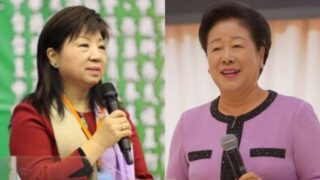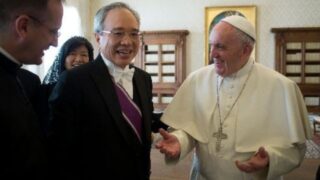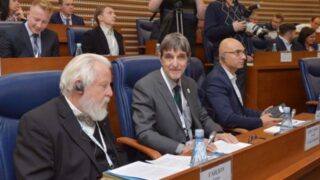An international seminar in San Jose offered a reflection on conscience, human rights, freedom, and the Tai Ji Men case.
by Daniela Bovolenta


On October 8, 2023, CESNUR and Human Rights Without Frontiers, in cooperation with Action Alliance to Redress 1219, co-organized a seminar on “California Land of the Free: A Call for Freedom and the Tai Ji Men Case” at the Hilton San Jose hotel in San Jose, California.
The seminar was introduced by Stefania Cerruti, External Relations Manager of MEDIS, the Major Emergencies and Disasters International School. She explained that California is the land of the free but for experts of disasters is also the land of earthquakes. She discussed in particular the two deadly earthquakes that hit San Francisco in 1906 and the San Fernando Valley in 1994. She noted how religions mobilized and helped significantly in the earthquake relief efforts. As usual, she said, new religious movements’ considerable help remained largely unacknowledged, as happened for Christian Science in 1906 and Scientology in 1994. Cerruti then mentioned the earthquake relief activities—not only material but also spiritual—of Tai Ji Men, including after the Taiwan earthquake of 1999 and the Türkiye earthquake of 2023 (which also affected Syria). She concluded by defining the confiscation of Tai Ji Men’s sacred land in 2020 as a “moral earthquake,” caused by human beings rather than by nature and also in urgent need of relief.


Cerruti then introduced the Shifu (Grand Master) of Tai Ji Men, Dr. Hong Tao-Tze, who emphasized that conscience is innate but can be awakened through daily meditation, introspection, and repentance. This cultivation of the heart also makes us attuned to peace and justice, Dr. Hong said, and able to gain spiritual health and real freedom. Spreading these teachings is the historical task of Tai Ji Men. “Let’s create real peace with love, Dr. Hong concluded. Let’s attain positive freedom with conscience.”


Cerruti presented the three speakers of the first session: Massimo Introvigne, an Italian sociologist who serves as managing director of CESNUR and editor-in-chief of “Bitter Winter”; Davide Suleyman Amore, an Italian historian of religions, a member of the Italian Association of History of Religions (SISR), and the secretary of “As-Salàm” Islamic Cultural Association, which manages a mosque where he sometimes serves as imam; and Peter Zoehrer, an Austrian journalist and the executive director of FOREF (Forum for Religious Freedom Europe).


Introvigne evoked the history of the Mormon Battalion, who was recruited in 1846 among the Latter-day Saints (nicknamed the “Mormons”) to serve in the American Army in the war against Mexico. The Mormons had been heavily persecuted in Illinois and wanted to emigrate to the West. They loved peace and did not want to serve for the American government that had not protected them from persecution. However, some 400 of them accepted to serve because their leader, Brigham Young, prophesied that they would not have to fight any battle (a prophecy that eventually came true). He also told them that forming the Battalion was necessary to raise money and obtain the needed benevolence of the American government for their westward migration. The long march of the Mormon Battalion was ultimately made for the sake of religious liberty, at the price of great sacrifices. Introvigne compared their story to the sacrifice of the Tai Ji Men dizi, who put their “stolen youth” at the service of a decades-long campaign of protest against persecution and for justice and legal and tax reform. The dizi’s sacrifice will also one day bear fruit, Introvigne concluded.
Amore told the story of another and even more famous march for freedom, the one of Prophet Muhammad and the Muslims from the Arab city of Mecca, where they were persecuted, to Medina, where they were able to practice their religion free. The march is known to Muslims as Al-Hijrah (“Migration”), and was more than a physical move. It was also a spiritual migration towards a deeper spiritual dimension of justice. Tai Ji Men dizi (disciples), Amore said, also had their “Hijrah.” Some, as happened with many dizi who came to the United States from Taiwan, migrated physically, for different reasons but sometimes also to escape the harassment against Tai Ji Men in Taiwan. The majority of the dizi stayed in Taiwan but, guided by their Shifu, made their spiritual “Hijrah” by deepening their understanding of peace, love, and justice. They now hope, Amore concluded, that justice may be rendered to them.


Zoehrer focused on the centrality of conscience in the teachings of Dr. Hong and Tai Ji Men. He discussed the notion of conscience in the West, in ancient pre-Christian civilizations, Christianity, and secular philosophy. Zoehrer also noted the fundamental relationship between conscience and freedom of religion or belief. When the contact with conscience is lost, he said, religious liberty is often denied. Dr. Hong, Zoehrer observed, teaches a very practical and sustainable path to cultivate a well-nurtured conscience. This path needs to be promoted internationally. Returning to conscience would also solve most problems of freedom of religion or belief, Zoehrer concluded, including the Tai Ji Men case in Taiwan.


Alessandro Amicarelli, a London-based human rights attorney and the president of the European Federation for Freedom of Belief (FOB) introduced the second session, where five dizi offered their testimonies. Amicarelli reported how he became aware of the fact that even in democratic countries there is considerable discrimination of religious minorities and decided to specialized on freedom of religion or belief. Through Massimo Introvigne, he said, he discovered the Tai Ji Men case, studied it, and understood it is one of the most important issues internationally of administrative discrimination and misuse of tax laws against a spiritual movement.


Annie Shen is a client software security project manager in an international technology company. She explained that the core of her job is telling customers the truth about what security software vulnerabilities they may have, whether they like it or not. As a Tai Ji Men dizi, she takes to their job Dr. Hong’s lesson that one should act with conscience in all fields. By participating in international events with Dr. Hong, and meeting luminaries such as former President of the Dominican Republic Leonel Fernández, she understood that the same principles apply to domestic and international politics as well. That some bureaucrats and politicians did not respect the principle of priority of conscience, Shen concluded, was on the other hand the root cause of the Tai Ji Men case. Only a return to conscience would allow to solve it.


Jason Cherng, a retiree and a veteran dizi, reflected on the meaning of liberty and on the tragedies of denial of freedom and repression during the Martial Law period in Taiwan. They are illustrated in the movie “City of Sadness,” which represented Taiwan at the 1989 Venice film festival. While Taiwanese media applauded the movie, the crackdown on Tai Ji Men and other spiritual movements in 1996 proved that its deep lesson had not been learnt. Cherng also illustrated the primacy of conscience through two images taken from different religions. In the Egyptian “Book of the Dead” the soul of a deceased person will survive only if her heart, when weighed on a scale, would balance goddess Ma’at “feather of truth.” In the Jewish and Christian Bible, when a great flood came, only a few righteous humans were allowed to board Noah’s Ark and survive. Those who follow conscience, Cherng said, have a righteous heart and board their spiritual Noah’s Ark. This is the fundamental teaching of Dr. Hong, he concluded, and one that if applied would guarantee justice and freedom.


Judith Chiu, channel business director at an international software company, reported her experience in her thirty years as a dizi. By practicing qigong, she overcame depression and infertility, and recently she was able to help her husband, who suffered a stroke last year but surprised the doctors with his recovery. With such a personal experience of the benefits dizi derive from Tai Ji Men, to which the international outreach of Dr. Hong’s message of peace and love should be added, Chiu finds it paradoxical and unjust that the movement should be continuously harassed through ill-founded tax claims and denied full freedom of religion or belief in Taiwan. She expressed the hope that this long-lasting injustice may soon cease.


Kenny Cheng, who is responsible for product stewardship in the Asia-Pacific region for an international company, emphasized the importance of the Movement of an Era of Conscience started by Dr. Hong and his efforts leading to the United Nations adding the International Day of Conscience, April 5, to its days of observance. The Tai Ji Men case in Taiwan, Cheng said, is a good example of the damages created when conscience is not prioritized by bureaucrats and politicians. By working for tax and law reform, Cheng has come to understand that the Tai Ji Men case is not isolated and that the problems caused by Taiwan’s National Taxation Bureau are systemic. Taiwan’s government, which made the United Nations’ Two Covenants on human rights part of its domestic legislation in 2009, should now respect them, starting by solving the Tai Ji Men case, Cheng concluded.


Sienna Lin, a graduate student, said that as a Tai Ji Men dizi she tries to learn the deepest meaning of freedom as the right to “choose what we love and love what we choose.” She has learned love and integrity, and how to become a successful student, by being a dizi. She has also suffered because of the misconception and slander about Tai Ji Men perpetuated by some media. She is inspired by the deep love of the United States and California for freedom—epitomized by American Revolution’s politician Patrick Henry’s motto “Give me liberty or give me death”—to publicly ask for justice for Tai Ji Men and seek the help of all international institutions and groups whose aim is to protect human rights, including freedom of religion or belief.


Marco Respinti, an Italian scholar and journalist who serves as director-in-charge of “Bitter Winter,” offered the conclusions of the seminar. He noted that in the English language, due to the historical process of its formation, two words translate the Latin “libertas” and its many derivative words in Latin languages such as “liberté” in France, “libertà” in Italian and so on: “freedom” and “liberty.” Although regarded as synonyms, their original meanings are slightly different. Freedom is a more theoretical concept and can also be a spiritual state. Liberty, with its plural “liberties,” indicate practical and concrete benefits in many different fields. One can be spiritually free even without enjoying the basic liberties.


Tai Ji Men dizi, Respinti concluded, are free because they keep the conscience as their moral compass. Their practical liberties are sometimes denied to them. However, those who are spiritually free in the end often defeat their enemies, Respinti said, and one day Tai Ji Men dizi will recover their liberties as well. It was the wish of all the participants of the well-attended seminar.










